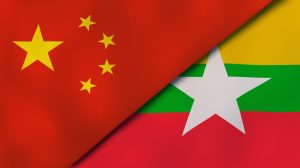China has reportedly urged Myanmar’s opposition National Unity Government (NUG) to ensure that its uprising against military rule does not harm Chinese investments in the country, a small step in the direction of Chinese engagement with the country’s shadow administration.
The revelation was reported in an article published by The Irrawaddy yesterday, which featured extracts of an interview with Yee Mon, the NUG’s defense minister. The poet and former political prisoner claimed that that the NUG had been approached by the Chinese Embassy in Yangon shortly after a January 7 attack in which a civilian militia group aligned with the NUG blew up three electricity pylons supplying power to the China-backed Tagaung Taung nickel processing plant in Sagaing Region. The attack forced the plant to halt production.
According to the article, Yee Mon assured the Chinese diplomats that the NUG would make sure similar incidents do not happen in the future, saying, “We don’t have a policy to attack the investments of neighboring countries.” But he also repeated the NUG’s call for foreign businesses to distance themselves from the military administration and avoid abetting its bloody consolidation of power. (Indeed, in July the NUG issued its own guidelines for foreign businesses operating in Myanmar.)
The military’s takeover last February was accompanied by an eruption of popular anger against the Chinese government, which was accused of supporting the coup (even knowing about it in advance), and prioritizing its own economic interests in the country – chief among them, the construction of an infrastructure land bridge linking China’s Yunnan province to the Andaman Sea.
Frequent demonstrations were held outside the Chinese Embassy in Yangon, and some livid anti-junta protesters even suggested that Beijing was opening itself up to attacks on key Chinese-built infrastructure in the country, including the two pipelines that pump oil and gas from coastal Rakhine State across the waist of Myanmar into Yunnan.
In mid-March, during large-scale demonstrations in Yangon’s industrial suburbs, several Chinese-run factories were smashed and set on fire, prompting stern rebukes from the Chinese state press. “China urges Myanmar to take further effective measures to stop all acts of violence, punish the perpetrators in accordance with the law and ensure the safety of life and property of Chinese companies and personnel in Myanmar,” the embassy said in a statement.
There are good reasons to believe that Beijing has unhappy with the coup, which disrupted its painstakingly cultivated relations with the National League for Democracy (NLD) government, but it eventually accepted the takeover as a fait accompli. Perhaps believing that the junta would eventually prevail against its coalition of opponents, by mid-2021 China had begun the slow process of reverting to business as usual.
However, the direct communication between Chinese officials and the NUG marks an incremental but potentially significant shift in Beijing’s approach to the situation in Myanmar. So far, the Chinese government has studiously avoided any engagement with the NUG, which the junta regards as a “terrorist” force, even as Chinese officials have warned the junta against banning the NLD altogether. But that stance is becoming increasingly difficult to sustain in a situation in which civilian militias loosely aligned with the NUG are mounting an increasingly successful armed campaign against the Myanmar armed forces.
One should be cautious about overstating the significance of this request, which was driven by pragmatic considerations by officials on the ground in Myanmar (rather than in Beijing), but it represents a vicarious recognition of the increasingly important role played by the opposition to Senior Gen. Min Aung Hlaing’s military administration and a nod toward the reality that there are two groups claiming the mantle of Myanmar’s legitimate government. If the junta’s fortunes take a further turn for the worse, expect Beijing to continue calibrating its position accordingly.































